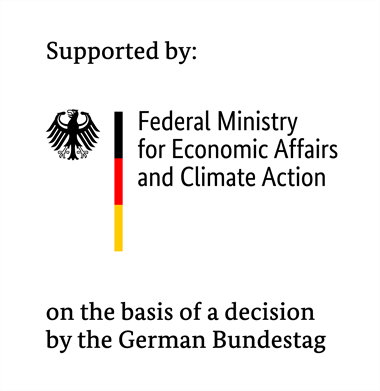Battery Pass – Implementation of a new generation of digital product handling
Background and aims
Electromobility is the key to climate-friendly mobility. In Germany, the government has set the goal of getting 15 million electric vehicles on the road by 2030 in order to achieve the climate targets. Accordingly, the ramp-up of electromobility will continue to gain momentum in the coming years. With the increasing number of electric vehicles, the demand for lithium-ion batteries for the vehicle drive system (traction batteries) is also growing. As an essential component of the electric vehicle, it is becoming increasingly important that these batteries are produced, used and recycled sustainably.
Lithium-ion batteries are criticised because of the high energy consumption in production and the high proportion of metallic raw materials. Therefore, it is a major concern of policy-makers and the stakeholders concerned to focus on the entire life cycle in the future and to shape value creation according to circular principles. This requires extending the life cycle of the entire battery system as far as possible and reusing the raw materials, materials and components after their first use phase. In addition, the creation of transparent supply chains for battery raw materials has to be considered. The digital battery passport provides an approach for implementing these requirements.
The consortium project Battery Pass aims to develop cross-industry content and technical standards for a digital battery passport and demonstrate them in a pilot project. The battery passport supports seamless documentation of the battery life from production and use to reuse and recycling. This is intended to enable the sustainable and circular management of traction batteries. Basic battery information as well as technical data are stored in the battery passport. In particular, data that comprehensively describe the sustainability and responsibility of the supply chain, such as greenhouse gas footprint, working conditions in raw material extraction, determination of battery condition (age/quality), recyclability and repair are to be documented in the battery passport and help to implement these steps. The data of the battery passport can be accessed and updated via corresponding infrastructures.
-
Support a sustainable transition to low-carbon mobility and energy storage, as well as a reduction in raw material extraction and dependency through increased material efficiency, lifetime extension, residual value determination and recycling of batteries
-
Documentation of data that comprehensively describes the sustainability and responsibility of the supply chain e.g. GHG footprint, working conditions in raw material extraction, determination of battery condition and further information, including on recyclability and repair as well as the implementation of these steps)
Elaboration of content-related and technical cross-industry standards for a battery passport and demonstration in a pilot project using a software prototype that demonstrates and verifies the basic concept and functionalities of a battery passport
Development of standardised indicators and criteria required for battery condition assessment
With the advancing discussion on the implementation of a circular economy, the topic of digital product passports is increasingly gaining attention. Although there are initial concepts, no widely applicable solution has yet been established either in practice or at the political level. Above all, there is a lack of integrated technical solutions based on standards and central databases that enable the use of product passports across different organisations and value chain participants.
For the work of the consortium project, the consolidation of various preliminary work already carried out is central in order to map data from all life phases of the batteries. In particular, the transmission and continuous updating of information during the use phase of traction batteries must be developed.
-
Developing and agreeing content standards, i.a. on carbon footprint, sustainable supply chains, circularity, battery status determination, transfer of liability, and auditability
Development and coordination of technical standards for open standard and open source applicability of the results
Practical piloting of the results in a demonstrator in the form of a software prototype
Analysis of the added value of the battery passport in specific use cases and in general
Coordination with national, EU and global stakeholders (standardisation organisations, industry and scientific associations, as well as governments)
Project duration:
04/2022 — 03/2025
Chair acatech:
Prof. Dr.-Ing. Thomas Weber
acatech - National Academy for Science and Engineering
Project lead:
Dr. Johannes Simböck
acatech Office
simboeck@acatech.de
Scientific advisors:
Dr. Lisa Risch
acatech Office
risch@acatech.de
Project partners reflect value chain for circular battery management
Project partners from different fields ensure that the results of the consortium project Battery Pass are scientifically and technically sound, relevant for industry and suitable for the development of a global sustainable battery value chain. Among the members of the consortium are leading companies from relevant industries, research institutions and academies as well as providers of digital services in open source standards, battery analytics and tracking and tracing. It is coordinated by SYSTEMIQ, a recognised company for system change towards more sustainable economies.
The project group explicitly supports the principles for sustainable battery value chains formulated by the Global Battery Alliance (GBA). The participation of the GBA as an associated partner integrates its preliminary work, involves its broad network of members including environmental and social organisations as well as global governmental organisations and ensures the global applicability of the results.
Project partners
-
acatech – National Academy of Science and Engineering
AUDI AG
BASF SE
BMW AG
Circulor GmbH
FIWARE Foundation
Fraunhofer-Institut für Produktionsanlagen und Konstruktionstechnik (IPK)
SYSTEMIQ
TWAICE Technologies GmbH
Umicore AG & Co KG
-
Global Battery Alliance (GBA)
GS1 Germany GmbH as representative for GS1 Europe
Kompetenznetzwerk Lithium-Ionen-Batterien (KLiB)
Mercedes Benz AG
RWE Generation SE
SAP SE
VDE Renewables GmbH
Further information
Website Battery Pass
Publication Circular Economy Roadmap for Deutschland
Publication Resource-Efficient Battery Life Cycles – Driving Electric Mobility with the Circular Economy
acatech Impulse Digital Sovereignty-Status Quo and Perspectives








